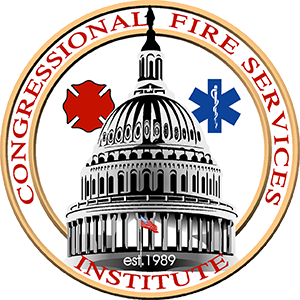President Biden Signs Infrastructure Investment and Jobs Act and Protecting America’s First Responders Act Into Law

This week, President Biden signed into law two bills that will benefit the fire and emergency services.
Infrastructure Investment and Jobs Act
The Infrastructure Investment and Jobs Act (P.L.117-58) provides significant funding for a broad range of infrastructure projects; however, the measure contains specific provisions directly benefiting the fire services.
To address the growing threat of wildfires, the measure:
- Provides the Department of the Interior and the Forest Service with approximately $3.4 billion in funding in fiscal years 2022-2026 for land restoration projects, technology and equipment acquisitions, data improvements, communication upgrades, at-risk community tracking, and more.
- Directs the Secretaries of Interior and Agriculture to implement changes in existing policies and procedures addressing the capabilities and safety of wildland firefighting personnel. This includes working with the Office of Personnel Management to create a wildland firefighter occupational series that will provide full-time employment and include duties like reducing hazardous fuels on public lands.
- Establishes a Community Wildfire Defense Grant Program through the Department of Agriculture that awards grants to at-risk communities to develop or improve community wildfire protection plans and carry out projects included in those plans.
- Creates the Wildland Fire Mitigation and Management Commission to study and improve federal policies relating to “the prevention, mitigation, suppression, and management of wildland fires in the United States” and “the rehabilitation of land in the United States devastated by wildland fires.”
The bill also contains provisions relating to traffic, highway, and motor vehicle safety, that will:
- Prioritize research relating to “vulnerable road users,” which includes first responders.
- Update the Manual on Uniform Traffic Control Devices to improve protection for vulnerable road users.
- Require highway safety programs to address reducing first responder injuries and deaths caused by the failure of pedestrian drivers to move over or reduce speed when emergency vehicles are responding to an emergency.
- Require the Comptroller General to conduct a study on the “efficacy of Move Over or Slow Down Laws and related public awareness campaigns.”
- Establish an electric vehicle working group, the goals of which include identifying research and development areas to improve fire safety.
The bill authorizes the Assistance for Local Emergency Response Training (ALERT) grant program, which supports hazmat response training. It is administered by the Pipeline and Hazardous Materials Safety Administration, housed under the Department of Transportation.In addition, the bill provides funding for FEMA’s Building Resilient Infrastructure and Communities (BRIC) program, which supports hazard mitigation projects.
Protecting America’s First Responders Act
Earlier today, President Biden signed into law the Protecting America’s First Responders Act (P.L.117-61). The bill expands the Public Safety Officer Benefits (PSOB) program and makes certain changes to allow the program to function in an improved manner.
Among the provisions, the bill specifies that public safety officers – including firefighters – who have suffered catastrophic injuries may continue to be employed as long as the employment meets certain criteria, such as minimal compensation, or work done for therapeutic purposes. The bill retroactively extends the updated disability provision to personnel who responded to the 9/11 attacks. The bill also expands eligibility to include public safety officers who were not previously covered, like fire-police; ties certain benefit amounts to when the ruling is made, not when the claim was filed; makes adjustments to the education benefit for dependents; and doubles the interim death payment from $3,000 to $6,000 and links it to the Consumer Price Index for adjustments.
In addition, the bill includes an extension of COVID-19 presumption, whereby a public safety officer who dies or is injured after contracting COVID-19 (within certain limits) is considered to have contracted the illness on the job and therefore is eligible for PSOB benefits.
More information on the PSOB program can be found on the Bureau of Justice Assistance website.
